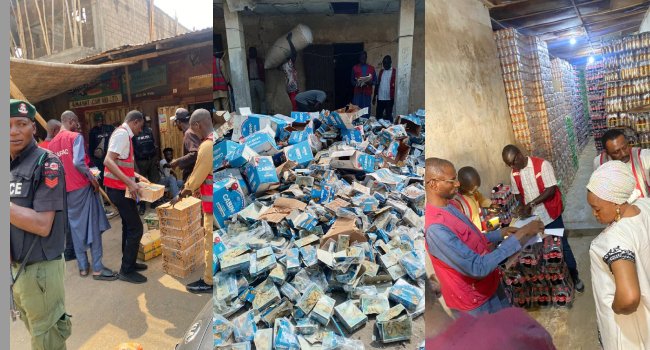THE National Agency for Food and Drug Administration and Control (NAFDAC) has sounded a grave warning that counterfeit medicines, unsafe foods, and unregulated cosmetic products have claimed more lives in Nigeria than the Boko Haram insurgency.
The revelation came from Dr. Martins Iluyomade, NAFDAC’s Director of Investigation and Enforcement, during a press briefing on Tuesday after a large-scale enforcement operation at the Lagos Trade Fair Market.
The five-day crackdown led to the seizure of over 10,000 cartons of unregistered tomato paste and cosmetic products, many of which, according to NAFDAC, posed serious health risks to unsuspecting consumers.
“I can say authoritatively that deaths from substandard medicines, cosmetics, and unsafe foods exceed the number of people killed by Boko Haram,” Dr. Iluyomade said.
“This is why the agency remains committed to ensuring Nigerians use only products that have passed regulatory processes, assuring safety and effectiveness.”
While Boko Haram’s reign of terror has made global headlines for over a decade, NAFDAC’s warning highlights a less visible but potentially deadlier crisis.
Nigeria ranks 6th on the 2025 Global Terrorism Index, accounting for 6% of global terrorism deaths in 2023, according to official data.
Figures from the Global Community Engagement and Resilience Fund (GCERF) show that since 2007, more than 11,000 people have been killed by insurgencies in Nigeria, with millions displaced.
However, Dr. Iluyomade insists that the death toll from fake drugs, adulterated food, and toxic cosmetic products is even higher, largely because these deaths often occur quietly, without the media attention that terrorism commands.
The GCERF report notes that Nigeria’s decades-long battle with insurgency—especially in the North-East, North-Central, and North-West—has devastated local economies and strained governance systems.
“In Nigeria, key drivers of violent extremism include limited trust in the government, security forces, and the justice system, limited socio-economic opportunities, and religious conflicts,” the report states.
GCERF has invested USD 11.75 million since 2016 to tackle the root causes of violent extremism, but NAFDAC warns that the fight against counterfeit products requires equally urgent national attention and investment.
Iluyomade said the agency’s recent market raid is part of an ongoing nationwide enforcement drive aimed at dismantling networks that import, distribute, and sell harmful products.
He urged Nigerians to always verify NAFDAC registration numbers on goods before purchase and called on market associations to cooperate with regulatory officials.
“The lives of Nigerians are at stake. We cannot afford to be complacent,” he said.
NAFDAC’s latest warning is expected to reignite debates on consumer safety, regulatory enforcement, and public awareness campaigns in a country where economic hardship has made cheap, unregulated products more attractive to millions of households.







